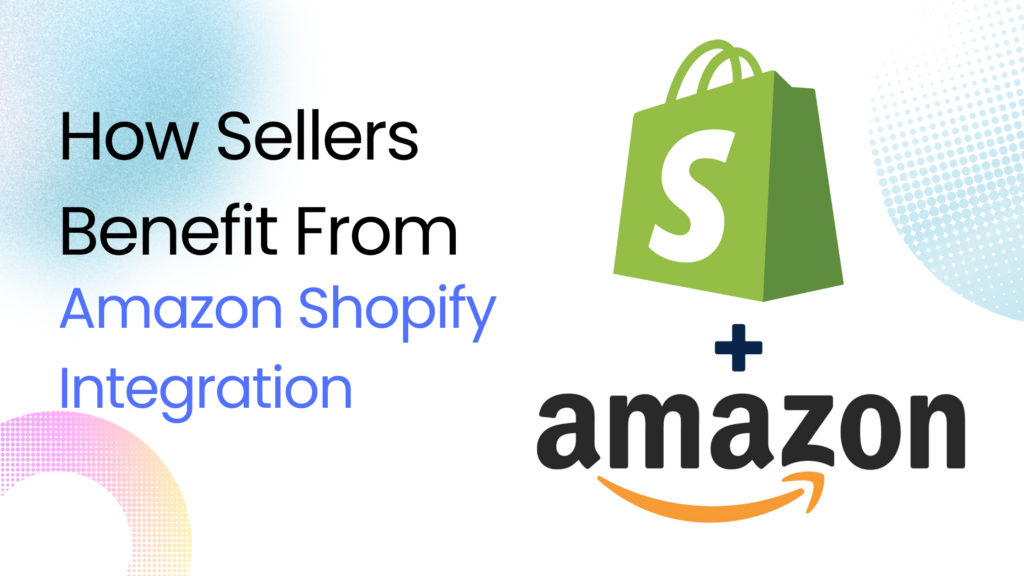How Sellers Benefit From Amazon Shopify Integration
What is Amazon Shopify Integration?
Do you ever consider integrating your Shopify store with Amazon? It comes with a number of benefits. The seamless integration of these two ecommerce platforms will transform your business.
When you integrate your Shopify store with Amazon, you expand your store. You broaden the store visibility when you link Shopify to Amazon. In turn, you get more sales and generate revenue for your business. You get access to deeper insights when you link Shopify with Amazon.
This helps in making better marketing decisions. In this blog, we will understand the mechanism of the integration and the strategies involved. We will also understand the benefits it gives when you connect Shopify with Amazon.
How Do You Integrate Shopify with Amazon?
As a seller, you might have pondered if you can connect Amazon to Shopify. Yes, you can and the integration opens doors for your ecommerce business. Integration of Shopify with Amazon allows the user to streamline operations. This allows them to manage both platforms from a single dashboard.
Here are the steps to integrate Shopify with Amazon:
Choose an Integration App
There are many third-party apps on the Shopify App Store. These apps facilitate integration with Amazon. Find the apps like “Amazon Sale Channel” or “Codisto LINQ”. Once the search is done, install the one that best fits your needs.
Connect the Amazon Account
After the installation is complete, you need to provide permissions to allow Shopify to access Amazon seller information. Once you are done, connect the Amazon Seller Account with Shopify.
Sync Product Listing
After connecting, you can sync your Shopify product listing with Amazon. In this process, you map the Shopify product attributes to the corresponding fields on Amazon. By this, you are ensuring consistency across both platforms.
Order Management
Once the integration is done, Orders placed on Amazon will show up on your Shopify Dashboard with the store’s orders. You can fulfill these orders directly from Shopify. This streamlines the order management.
Inventory Monitoring
You can keep track of inventory levels across both platforms in real time. Inventory updates made in Shopify will reflect on Amazon. This will help in managing your inventory and preventing overselling or stockouts.
Price and Shipping Setup
After the account on Shopify is connected to Amazon, you can set up shipping and pricing. You can customize pricing and shipping settings directly within Shopify. You can also adjust prices, set shipping rates, and manage promotions seamlessly.
List Optimizing
Use Shopify’s feature of listing for better visibility to sell on Amazon. The optimization includes product details, titles, descriptions, and images. They should align with Amazon’s search algorithm.
What are the Benefits of Amazon Shopify Integration?
Becoming a global entrepreneur in the ecommerce market has never been easy. With so many online platforms, inventory fulfillment options, and automation tools, it becomes difficult to make a choice. Learn how to sell Amazon products on your Shopify store with our explanation of Amazon Shopify Integration benefits.
Expanded Reach
By integrating Amazon with Shopify, merchants can tap into Amazon’s vast customer base. You also gain access to millions of potential buyers worldwide. This reach and visibility can increase sales and growth.
Centralized Management
The integration allows the management of Shopify and Amazon sales channels from a single dashboard. This centralized approach simplifies inventory management, order processing, and product listings. This saves time and reduces the risk of errors.
Enhanced Customer Experience
Integration enables seamless synchronization of product listings, pricing, and inventory levels. Being consistent will ensure that the customers have the correct information regardless of platform use. This leads to improved trust and satisfaction.
Order Fulfillment Efficiency
Orders from Amazon are automatically synced into the Shopify dashboard for fulfillment. This eliminates the manual data entry process and reduces the risk of order processing errors. It usually results in faster order fulfillment and happier customers.
Inventory Syncing
Inventory management becomes easy as integration enables real-time sync of inventory levels. Happening across Amazon and Shopify, it ensures that the merchant has the correct stock information on the Amazon marketplace. Thus, the merchants can maintain inventory levels and avoid missed sales opportunities.
Potential Challenges and Solutions for Amazon Shopify Integration
Combining Amazon and Shopify helps business owners, but also brings challenges. Here are some common challenges with solutions:
Product Listing Synchronization
Challenge – If you are managing a large inventory then keeping product listing consistent is challenging. This happens across Amazon and Shopify.
Solution – Use integration apps or tools that sync product listings automatically. These tools will ensure that product information, prices, and inventory levels remain consistent.
Order Management
Challenge – Separate order management on Amazon and Shopify can lead to confusion and inefficiency.
Solution – Incur an order management system that combines orders in one dashboard. By this, you will be able to process orders efficiently and reduce the risk of errors.
Inventory Management
Challenge – Maintaining accurate inventory levels across Amazon and Shopify can be difficult. This might lead to overselling and stockouts.
Solution – Using inventory management software that will sync inventory levels in real time. With accurate stock information, you will prevent issues like overselling.
Shipping and Fulfillment
Challenge – Coordinating shipping and fulfillment can be complex, especially if you use different fulfillment methods.
Solution – Choose a fulfillment strategy that works for both platforms. It should accept self-fulfillment, and fulfillment by Amazon FBA, or a third-party logistics provider. Make sure that the method you use is seamless with both ecommerce platforms.
Customer Service
Challenge – It could be quite challenging to provide consistent customer service especially when managing inquiries and returns.
Solution – Implement a centralized customer service system that handles inquiries from both platforms. This guarantees customers get consistent and prompt support no matter where they buy from.
Expert Tips for Maximizing the Benefits of Amazon Shopify Integration
“Can Shopify integrate with Amazon?” This has been the most inquired question because you want to have a seamless integration. You can maximize the benefits of Amazon Shopify Integration. You can do this with the help of strategic planning and execution. Here are some tips:
- Make sure that the product listings are optimized on both Amazon and Shopify. Use relevant keywords, high-quality images, and detailed descriptions to attract potential customers.
- Avoid overselling and stockouts by inventory sync on both platforms. Use inventory management tools to automate this process and maintain accurate stock levels.
- Centralize order processing for both platforms by using order management software. This helps streamline fulfillment, reduce errors, and improve efficiency.
- To enhance the shopping experience, provide consistent customer service by Amazon integration plus. Build trust and loyalty by promptly responding to queries and inquiries. This will help in selling products on an increased level.
Conclusion: The Future of Ecommerce with Amazon Shopify Integration
The future of ecommerce with Amazon Shopify integration looks promising. Technology evolves and consumer preferences shift, businesses embrace this integration. The benefits are increased reach, streamlined operations, and improved customer experiences. With the help of both platforms, merchants can expand their market presence and enhance their brand visibility.
It’s important for businesses to stay agile and adapt to change as per the market trends. This will capitalize on the synergies offered by Amazon Shopify integration to thrive in the competitive online marketplace.





